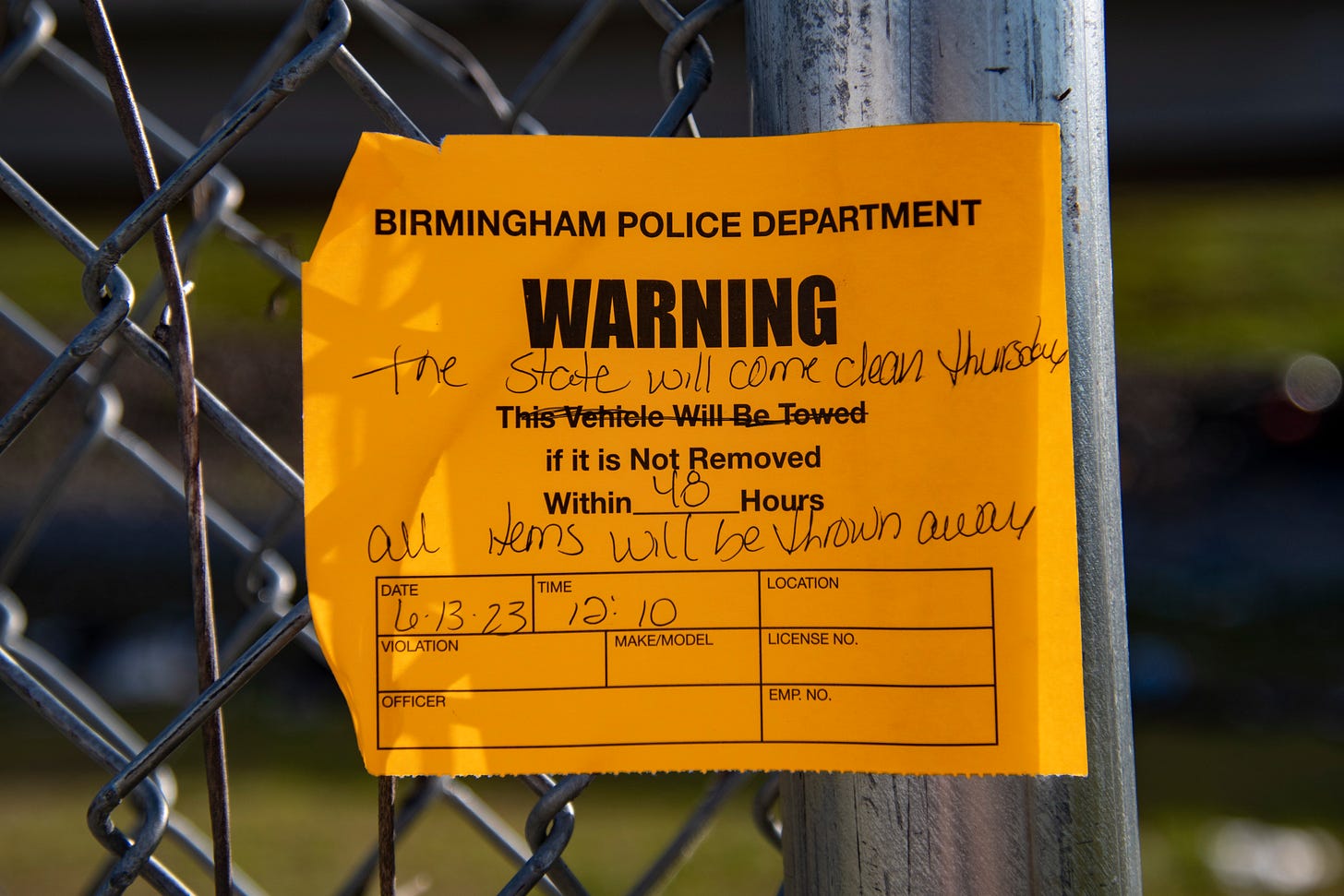'Thrown away': Birmingham neighbors facing homelessness prepare for Thursday 'sweeps'
Police posted warning notices on tents, fences around the Magic City
They don’t know where they’re supposed to go.
But the half-typed, half-handwritten notices Birmingham police posted in at least half a dozen locations in the city earlier this week were clear.
“WARNING,” the bright orange notices informed individuals facing homelessness in Birmingham. “The state will come clean thursday (sic) if it is Not Removed Within 48 Hours all items will be thrown away.”
The notices — hand-edited versions of vehicle tow warnings issued by the city — adorned fences, underpasses, and even tents owned by those individuals sleeping on the city’s streets.
Often, the property being targeted by “the state” is among the few possessions owned by those facing homelessness. Now, though, these Birmingham neighbors face a dilemma — where will their property go? And without a mattress or pallet, where will they sleep?

Richard Thomas, 58, and Joe Humphries, 68, often sleep under I-65 in downtown Birmingham. Tread interviewed the men as they sat on a sidewalk in the city, the interstate overpass — mattresses and makeshift dwellings scattered beneath — just a stone’s throw away.
Both men said the state certainly has the authority to remove their property but that officials give little thought to what comes after.
“You have to sleep somewhere,” Humphries told Tread. “That’s where the problem starts.”
“I thought this was the land of the free,” Thomas said. “It feels more like Russia.”
The sweeps in Birmingham come as unsheltered homelessness in Birmingham is at its highest point since at least 2016, the earliest year in data published by One Roof, the city’s lead advocacy organization for those facing homelessness. Experts on the subject, including One Roof’s Michelle Farley, have said that the actual numbers could be as high as four times what’s reported in the annual count.
In a 2022 issue brief on so-called “homeless sweeps,” the National Health Care for the Homeless Council emphasized that such actions by state and local governments do nothing to reduce homelessness.
“Encampments can be unsafe, violent, and unhealthy places, and public health officials are rightly concerned about the impact of these congregate settings on vulnerable,” the report said. “However, encampment sweeps are counterproductive, costly, and harmful.”
Such sweeps, sometimes referred to as “clean-ups,” can compromise the individuals experiencing homelessness’ personal safety and civic trust, undermine paths to housing and financial stability, and create unnecessary costs for local communities.
“Image someone kicking in the front door to your house, demanding that you leave, then trashing all your household possessions,” said David Peery, co-chair of the National Consumer Advisory Board. “That’s exactly what happens when police and city workers sweep a homeless encampment.”
Tread reached out to both Birmingham police and state officials about the announced sweeps but has not heard back as of publication time.
UPDATE: In a statement sent after this article’s initial publication, Truman Fitzgerald, a spokesperson for the Birmingham Police Department, claimed BPD was “unaware” of department participation in placing the warning notices. Provided the photograph of the notice included in this story, Fitgerald said their use was incorrect and unauthorized. The department will “discuss the issue” with individual precincts, he said.
“This Warning is not an authorized notice for this scenario.
I was under the impression the State of Alabama put a notice out as they have done in the past.
This warning commonly referred to as an ‘orange sticker’ has no enforcement power when use as incorrectly as it was in this scenario. The orange sticker is only used for abandoned vehicles.”
-Truman Fitzgerald, Assistant Public Information Officer for BPD




I remember just a few weeks ago https://www.fastcompany.com/90834399/can-these-micro-shelters-help-birminghams-chronically-homeless-population-transition-to-housing